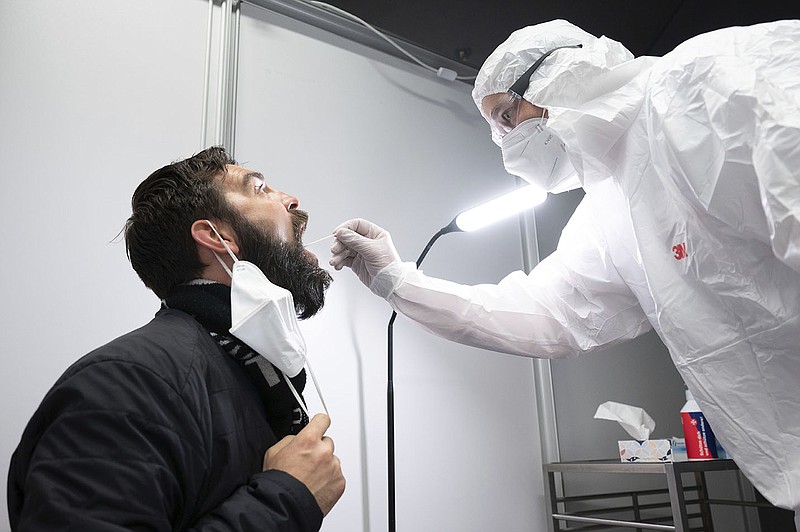A surge in coronavirus infections in western Europe has experts and health authorities on alert for another wave of the pandemic in the United States, even as most of the country has done away with mask requirements and other restrictions after a sharp decline in cases.
Infectious-disease experts are closely watching the subvariant of omicron known as BA. 2, which appears to be more transmissible than the original strain, BA. 1, and is fueling the outbreak overseas.
Germany, a nation of 83 million people, saw more than 250,000 new cases and 249 deaths Friday, when Health Minister Karl Lauterbach called the nation's situation "critical." The country is allowing most coronavirus restrictions to end Sunday, despite the increase. The United Kingdom had a seven-day average of 65,894 cases and 79 deaths as of Sunday, according to the Johns Hopkins University Coronavirus Research Center. The Netherlands, home to fewer than 18 million people, was averaging more than 60,000 cases the same day.
About a dozen nations are seeing spikes in coronavirus infections caused by BA. 2, a cousin of the BA. 1 form of virus that tore through the United States over the past three months.
A number of variables -- including relaxed precautions against viral transmission, vaccination rates, the availability of anti-viral medications and natural immunity acquired by previous infection -- may affect the course of any surge in the United States, experts said.
"It's picking up steam. It's across at least 12 countries ... from Finland to Greece," said Eric Topol, director of the Scripps Research Translational Institute in San Diego. "There's no question there's a significant wave there." He noted that hospitalizations for covid-19 are rising in some places as well, despite the superior vaccination rates of many western European countries.
At a briefing Monday, White House press secretary Jen Psaki said there have been about 35,000 cases of BA. 2 in the United States to date. But she offered confidence that "the tools we have -- including mRNA vaccines, therapeutics and tests -- are all effective tools against the virus. And we know because it's been in the country."
Kristen Nordlund, a spokeswoman for the Centers for Disease Control and Prevention, said in an email Tuesday that "although the BA. 2 variant has increased in the United States over the past several weeks, it is not the dominant variant, and we are not seeing an increase in the severity of disease." The seven-day average of cases in the U.S. fell 17.9% in the past week, according to data tracked by The Washington Post, while the number of deaths dropped 17.2% and hospitalizations declined 23.2%.
In the United States, 65.3% of the population, 216.8 million people, are fully vaccinated, and 96.1 million have received a booster shot, according to data tracked by The Post. In Germany, nearly 76% are fully vaccinated, according to the Johns Hopkins data, and the United Kingdom has fully vaccinated 73.6%.
That lower vaccination rate is likely to matter as BA. 2 spreads farther in the United States, especially in regions where it is significantly lower than the national rate, several experts said. And even for people who are fully vaccinated and have received a booster shot, research data are showing that immunity to the virus fades over time. Vaccine-makers Pfizer and BioNTech asked the Food and Drug Administration on Tuesday for emergency authorization to offer a fourth shot to people 65 and older.
As the public sheds masks -- every state has dropped its mask mandate or announced plans to do so -- another layer of protection is disappearing.
BA. 2 appears to be spreading more slowly in the United States than it has overseas, for reasons that aren't entirely clear, Debbie Dowell, chief medical officer for the CDC's covid-19 response, said Saturday in a briefing for clinicians sponsored by the Infectious Diseases Society of America. Dowell told the clinicians the speculation she has seen is that the subvariant may extend the curve from omicron but is unlikely to cause another surge.
Biden administration officials said that whatever the further spread of BA. 2 brings to the United States, the next critical step is to provide the $15.6 billion in emergency funding Congress cut last week from a deal to fund the government. That money was slated to pay for coronavirus tests, more vaccines and anti-viral medications.
"That means that some programs, if we don't get funding, could abruptly end or need to be pared back, Psaki said at Monday's briefing. "And that could impact how we are able to respond to any variant."
NO RISE IN DEATHS
Despite the speculation surrounding BA.2, the number of new coronavirus deaths reported worldwide fell by 17% in the last week, even as the rise in covid-19 infections reversed a decline in cases that first began in January, according to the World Health Organization.
In the U.N. health agency's weekly report on the pandemic issued late Tuesday, the WHO said there were more than 11 million new covid-19 infections last week, about an 8% rise, and 43,000 new deaths. The number of covid-19 deaths globally has been dropping for the past three weeks.
The biggest increases in cases were seen in the Western Pacific and Africa, where infections rose by 29% and 12%, respectively. Cases dropped by more than 20% in the Middle East, Southeast Asia and the Americas. In Europe, cases inched up by about 2%.
The WHO said those numbers "should be interpreted with caution," noting that many countries are changing their covid-19 testing strategies as they exit the acute phase of the pandemic, and are testing far less than previously.
Information for this article was contributed by Lenny Bernstein, Joel Achenbach and Lena H. Sun of The Washington Post and staff members of The Associated Press.
